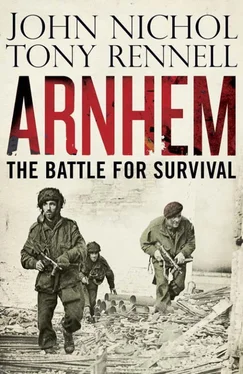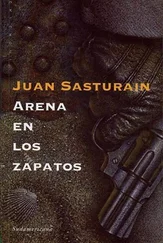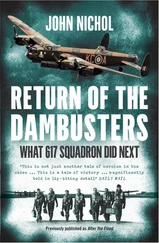The successful D-Day landings in Normandy in June 1944 – news of which the Dutch heard as they crouched around illicit wirelesses and crystal sets – raised any flagging spirits. Then, after weeks of tough fighting to crack stiff enemy resistance to their advance, the Allies broke through and roared across France and Belgium, chasing the German army ‘like a hunt after a fox on a glorious spring day’, as one historian put it. [5] Sir Alistair Horne in Monty, the Lonely Leader . Macmillan, 1994.
Paris was liberated, then Brussels. The Germans were in full retreat, whole armies speeding eastwards for the safety of the Rhine and the fortified Siegfried Line. The Netherlanders waited for their turn, anxious to be free too. September came, full of hope, speculation, expectation. But anticipation was to be avoided at all costs. Defy the jittery occupying Germans too openly and too early, and disaster could strike. Rumour was deadly dangerous if it ran too far ahead of reality. But defiance was undoubtedly growing, and an encouraging message was passed by radio from London that Prince Bernhard, son-in-law of the exiled Queen Wilhelmina, had been appointed commander-in-chief of the so-called ‘Dutch Forces of the Interior’, the Resistance army. With this came a plea for everyone to stay calm. ‘We have to wait for the prince’s orders,’ fifteen-year-old Marie-Anne, another of Oosterbeek’s young inhabitants, confided to her diary. [6] The Tommies are Coming. Diary of an Oosterbeek Girl . Surname unknown. Airborne Museum, Oosterbeek. Copy lodged at Airborne Assault, Imperial War Museum, Duxford.
For all this apparent caution, early in September the nation lost its patience and its self-control in what was ever after known as Dolle Dinsdag – Mad Tuesday. The word spread that Antwerp, the Belgian port on the Scheldt estuary, had fallen to the Allies. The door into Holland had been flung open, or so it seemed. ‘We’re next’ was the thought in everyone’s mind. In the cities, patriotic orange flags appeared in windows and crowds gathered in the streets, encouraged by the sight of the German military hurriedly packing. Bonfires blazed in the courtyards of official buildings as the occupiers destroyed piles of secret documents, a precursor, it seemed, to leaving. Members of the NSB, the SS force formed from Dutch Nazis, prepared to disappear before they paid for their collaborating misdeeds at the end of a lynch mob’s rope. At Oosterbeek, an excited Anje was swept along by the tide of hope. ‘I talked to my friends about how we’d soon be free. And the boys would come home – my brothers and my boyfriend Rob, who was in hiding in the north and whom I hadn’t seen for two years.’ She climbed with her family to the roof of their house and stared into the distance, straining to see British soldiers. ‘Where are the Tommies?’ they asked each other.
The answer – though, on that Oosterbeek rooftop, the van Maanens had no means of knowing it – was that the Allied ground forces were between 60 and 70 miles away. The British Second Army – commanded by General Miles Dempsey and part of Montgomery’s 21st Army Corps – was strung out along the southern bank of the Meuse-Escaut canal, which formed the border between liberated Belgium and the still-occupied Netherlands. It had come to a halt. After the breakneck canter from Normandy, it had run out of steam – steam and, more importantly, supplies. The port of Antwerp was in Allied hands all right, as all those wildfire Dutch rumours had said. But the rest of the Scheldt estuary giving access to the North Sea was not. The shores continued to be held by the Germans, and there was no way for relief ships to get into the docks and wharves of Antwerp past their big guns. The over-extended Allies were left still tied umbilically to the French port of Cherbourg, 350 miles away, as the sole entry point into Europe for desperately needed re-supplies of equipment, guns, ammunition, food: everything. Thousands of laden trucks – the Red Ball Express, as the largely American drivers called themselves – trundled northwards from Cherbourg in convoy, moving as fast as they could to feed the front line, then turned round and went back for more. But the distances were getting longer and the logistics tougher all the time. The onward rush was grinding to a halt, and serious consideration was given to the next step.
The obvious military move was to backtrack, go west not east, crush the Germans dug in along the Scheldt, open up Antwerp to shipping, ease the supply chain, then resume the drive eastwards to Germany. But that would be costly, in manpower and time. And the impetus would be lost. On the other hand, standing there on the Meuse-Escaut canal and looking at a map of what lay ahead, the German border seemed tantalizingly near, almost within reach. And wide open. If only the Allied armies could race through Holland as they had raced through France and Belgium, then they would be round the enemy’s line of fortifications, in by the back door and on their way to Berlin. There was a problem, of course, with all those Low Countries waterways. If each canal, stream and river had to be assaulted one by one, the Allies might end up stalled and stymied as they had been for so long by the narrow lanes and high hedges of Normandy. Control of the bridges would be crucial, making sure they were captured intact before the retreating Germans demolished them. Allied commanders paused for thought.
Meanwhile, in the Netherlands, life for the locals became harder and more dangerous as the occupying German forces reacted to the enemy at the gate not by running – as, for a while, everyone had thought certain – but by regaining their nerve and cracking down on every hint of opposition. After Mad Tuesday, a state of emergency was proclaimed and a dire warning given that groups of more than five people gathering in the streets were liable to be shot. Curfew was brought forward to 8 p.m. Normal life virtually ceased. Trains stopped running, the mail didn’t get through, the phones went dead. Food was scarce, ration books pointless. Individuals were grabbed at gunpoint in the cities to dig shelters and defensive trenches. Even worse, men were routinely abducted for transportation to be slave labour in Germany. Now it was not just the young and the fit with reason to fear the round-up. All males under fifty were at risk, picked up at random on the streets or winkled out from their homes in brutal house-to-house searches. Suddenly, liberation was more desperately needed than ever.
At Oosterbeek, the once quiet village was filling up with retreating German soldiers demanding billets in people’s homes, requisitioning the school for a depot, erecting anti-aircraft guns in the meadows. Their manners were brusque and threatening. Marie-Anne thought them ‘tiresome’ and ‘vulgar’. A Feldwebel [sergeant] marched into her garden and demanded to inspect her father’s bicycle workshop. When she got back from a trip to the shops – ‘You queue for hours and then at the butcher’s I get 5ozs of meat, for the six of us! We won’t grow fat on that lot’ – he was not only still there but had taken charge. The workshop had been cleared out and converted into a field kitchen for his platoon. She wanted to object, ‘but the time has not yet come that we can ignore what the “ Herren ” order us to do.’ Everywhere there were signs that the situation was worsening. ‘In the afternoon I went across the river to get some pears. The ferry is now guarded by the SS.’
Confrontation and hostility were in the air and violence not far behind, as the 22-year-old Heleen Kernkamp discovered. She had left her job in Amsterdam and was in Arnhem, her home town, staying with friends from her schooldays. Two of them had jobs in a large local plastics factory, the biggest employer in the town, whose bosses were ordered by the Germans to provide a workforce to dig trenches. The patriotic Dutch directors bravely refused to comply. Instead, they shut down the factory and gave their workers six weeks’ pay, enough for those who felt threatened to go into hiding. ‘The tension in Arnhem was tremendous,’ she recalled. People locked themselves away at home, trying to hide their menfolk. The streets were deserted, except for the Germans stripping the factory. Massive machines were dismantled to be carted off to Germany. The Dutch were dismayed. Their loss would be a terrible blow to the local economy, to jobs and livelihoods. But what could they do to prevent this ransacking of the town’s assets? On the night of 15 September, a local resistance group blew up a railway viaduct to delay the machinery being taken away. The Germans retaliated. Posters appeared warning that if the perpetrators were not found, an unspecified number of civilians would be taken hostage and summarily executed. ‘We discussed these reprisals all day long. Who would they take? How many?’ The deadline was noon on 17 September. Arnhem and its people were desperate and afraid. A massacre seemed unavoidable. ‘We hardly slept that night, fearing what the next day would bring.’ The salvation they dreamt of was to come from a totally unexpected direction – out of the sky.
Читать дальше












